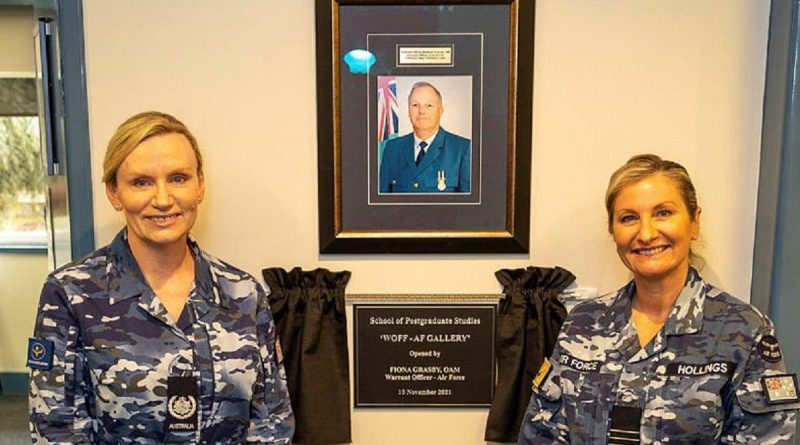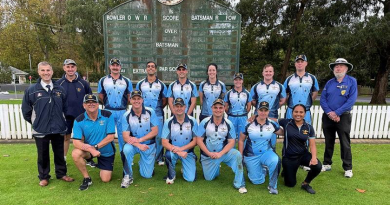School portrait gallery a tribute to leaders

Air Force’s School of Postgraduate Studies (SPS) at RAAF Base Wagga has honoured the Warrant Officers of the Air Force (WOFF-AF) by installing a gallery of photographs of all those who have held the position since it was instituted in 1993.
CAPTION: Warrant Officer of the Air Force Fee Grasby, left, and Commanding Officer of the RAAF School of Postgraduate Studies Wing Commander Kerry Hollings open the Warrant Officer of the Air Force Gallery at the school. Photo by Sergeant John Marshall.
Unveiling the eight portraits on the wall of SPS Headquarters on November 10, current WOFF-AF Fee Grasby praised the contribution of the Air Force’s talented enlisted personnel.
“The opening represents a recognition of leaders at all levels of the Air Force,” WOFF-AF Grasby said.
“This is not about the individual in the position, but about what we represent as warrant officers – senior enlisted leaders supporting command and the workforce, focused on the welfare of all.”
SPS Warrant Officer Carol Lilley said the reinvigoration of the Chief of Air Force and WOFF-AF gallery and portraits, and the formation of a separate gallery for the WOFF-AF, was the result of considerable work by Warrant Officers Craig Kennedy and Jason Randell.
“In our [Air Force’s] centenary year, SPS identified the need to recognise the importance and impact of the role of WOFF-AF has had on Air Force constituents and reflect on their tenure,” Warrant Officer Lilley said.
“The WOFF of the RAAF position was created by then-chief of staff Air Marshall Barry Gration and the inaugural appointment went to WOFF Richard Newton in 1993.
“In 2005 the position title may have changed from WOFF of the RAAF to WOFF-AF; however, the office-holder was still lauded for their impeccable attributes and assiduous service to Air Force and the greater Defence community.
“In addition to being a conduit between senior Air Force leadership and other ranks, the WOFF-AF also supports command and the workforce – championing diversity and the continued development of our culture with a strong focus on professionalism, education and professional development and welfare.”
.
.

.
.





